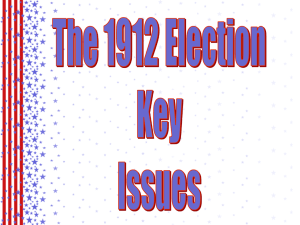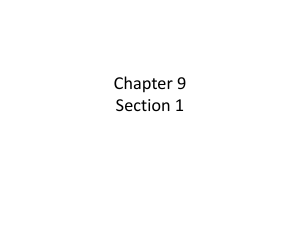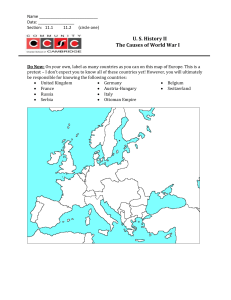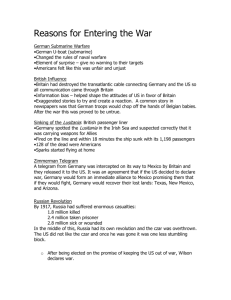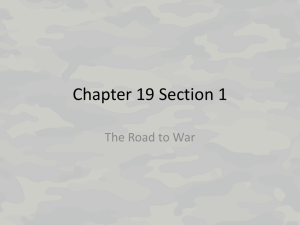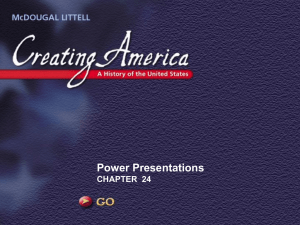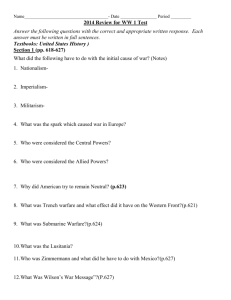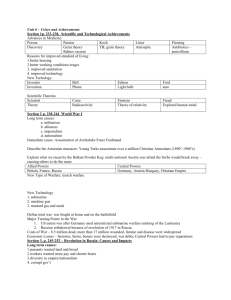Page | 1 WORLD WAR I Wilson's Moral Diplomacy Wilson: resolved
advertisement
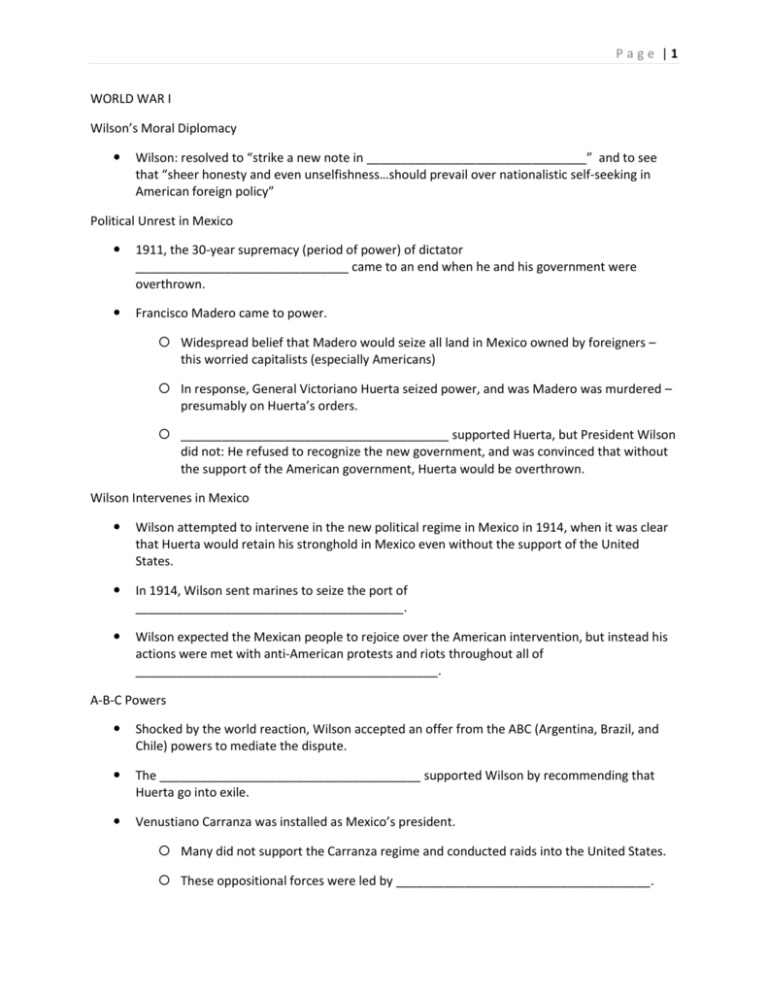
Page |1 WORLD WAR I Wilson’s Moral Diplomacy Wilson: resolved to “strike a new note in ________________________________” and to see that “sheer honesty and even unselfishness…should prevail over nationalistic self-seeking in American foreign policy” Political Unrest in Mexico 1911, the 30-year supremacy (period of power) of dictator _______________________________ came to an end when he and his government were overthrown. Francisco Madero came to power. Widespread belief that Madero would seize all land in Mexico owned by foreigners – this worried capitalists (especially Americans) In response, General Victoriano Huerta seized power, and was Madero was murdered – presumably on Huerta’s orders. _______________________________________ supported Huerta, but President Wilson did not: He refused to recognize the new government, and was convinced that without the support of the American government, Huerta would be overthrown. Wilson Intervenes in Mexico Wilson attempted to intervene in the new political regime in Mexico in 1914, when it was clear that Huerta would retain his stronghold in Mexico even without the support of the United States. In 1914, Wilson sent marines to seize the port of _______________________________________. Wilson expected the Mexican people to rejoice over the American intervention, but instead his actions were met with anti-American protests and riots throughout all of ____________________________________________. A-B-C Powers Shocked by the world reaction, Wilson accepted an offer from the ABC (Argentina, Brazil, and Chile) powers to mediate the dispute. The ______________________________________ supported Wilson by recommending that Huerta go into exile. Venustiano Carranza was installed as Mexico’s president. Many did not support the Carranza regime and conducted raids into the United States. These oppositional forces were led by _____________________________________. Page |2 Villa’s guerilla forces attacked and burned the city of Columbus, New Mexico, killing 18 Americans in the process. Aggressive Nationalism Nationalism can be a positive force, binding together a nation’s people. i.e. Saint Patrick’s Day, Cinco de Mayo… At the same time, national pride can fuel bitter conflicts. In the 1900s, aggressive ________________________________________ was a leading cause of international tension. Alsace and _______________________________________ Nationalism was strong in Germany and France. Germans were proud of their new empire’s military power and industrial leadership. France longed to regain its position as Europe’s leading power. The French were still bitter about their defeat in the Franco-Prussian War War fought in 1871 between the _____________________________________________, leading to the end of French dominance over Europe world affairs. The French especially resented German occupation of the border provinces of Alsace and Lorraine. Patriotic French citizens longed for revenged against Germany and recovery of the “lost provinces”. Pan-Slavism In Eastern Europe, Russia sponsored a powerful form of nationalism called Pan-Slavism. All Slavic peoples shared a common nationality. As the largest Slavic country, Russia felt that it had a duty to lead and defend all Slavs. By 1914, Russia stood ready to support ________________________________, an ambitious young Slavic nation, against any threat. Crisis in the Balkans Two old multinational empires particularly feared rising nationalism in Eastern Europe. _________________________________________ was worried that nationalism might foster rebellion among the many minority populations within its empire. Page |3 Ottoman _______________________________ felt threatened by new nations on its borders, such as Serbia and Greece. Serbia was especially aggressive - it dreamed of creating and ruling a South Slav state. Economic Rivalries Economic rivalries further poisoned the international atmosphere. The British felt threatened by Germany’s rapid ___________________________________ growth. By 1900, Germany’s new, modern factories increasingly out produced Britain’s older ones. Britain therefore had strong economic reasons to oppose Germany in ______________________ conflict. Germany, in turn, thought the other great powers did not give them enough respect. Imperial Rivalries Imperialism also divided European nations. In 1905 and again in 1911, competition for colonies brought France and Germany to the brink of war. Germany wanted to keep France from imposing a protectorate on the _________________________________________ kingdom of Morocco. Although diplomats kept the peace, Germany gained some territory in Central Africa. As a result of the two Moroccan crises, Britain and France began to form closer ties against Germany. Militarism The late 1800s saw a rise in ____________________________ – the glorification of the military. Under militarism, the armed forces and readiness for war come to dominate national policy. Militarists painted war in romantic colors. Young men dreamed of blaring trumpets and heroic cavalry charges – not at all the sort of conflict they would soon face. The rise in militarism grew partly out of the ideas of Social Darwinism. Echoing the idea of “survival of the fittest,” the German militarist Friedrich von Bernhardi claimed that war was “a biological necessity of the first importance.” Page |4 The Arms Race As international ________________________________ grew, the great powers expanded their armies and navies. The result was an arms race that further increased suspicions and made war more likely. The fiercest competition was the ________________________________________ between Britain and Germany. To protect its vast overseas empire, Britain had built the world’s most respected navy. When Germany began to acquire colonies, it began to build up its own navy. The Central Powers The first alliances had their origins in __________________________________________ day. He was aware that France longed to avenge its humiliating defeat in the Franco-Prussian War. Knowing that ______________________________ would not attack Germany without help, Bismark signed treaties with a number of the other great European powers. In 1872, Germany joined a weak alliance with Austria-Hungary and Russia (Reinsurance Alliance). Ten years later, Germany formed the Triple Alliance with Austria-Hungary and Italy. The Central Powers (continued) After Birmark resigned, Kaiser Wilhelm II pursued his own policies. He preserved the Triple Alliance However, he allowed Bismark’s _____________________________________ with Russia in 1887 to lapse. Thus, Russia was able to make its own, new alliances. In 1914, when war did erupt, Germany and Austia-Hungary fought on the same side –they became known as the Central Powers. The Allies A rival bloc took shape in 1894, when France and Russia signed an alliance. In 1904, France and Britain signed an __________________________________ “friendly understanding.” Though not as binding as a treaty, the entente led to close military and diplomatic ties. Three years later, Britain signed a similar agreement with Russia. When war began, powers became known as the Allies. Page |5 Consequences of Alliances Other nations were drawn into alliances. Germany signed a treaty with the ____________________________________. Britain drew close with Japan. Rather than easing tensions, the growth of rival alliances made governments increasingly nervous. A local conflict could easily mushroom into a general war. In 1914, that threat became a horrifying reality. United States _____________________________________________ As war consumed Europe, Americans hoped the vast Atlantic Ocean would keep them out of the conflict. President Wilson stated that this was “a war with which we had nothing to do.” Taking Sides America couldn’t help but take sides. Immigrants of European nationality groups gave many Americans roots that influenced their opinions. In general, the common _____________________________ shared by the United States and Britain, and America’s historic links with France, put American public opinion on the side of the Allies. Both Sides Strain Neutrality America’s neutrality did not protect it from either the Allies or the Central Powers. The British imposed a blockade on the ____________________________________. They planted mines in the North Sea, forced neutral ships into port for inspection, opened American mail, and redefined contraband, or prohibited materials, so that not even food could be shipped to Germany. Trade between the United States and the Central Powers shrank. At the same time, exports from the United States to the Allies nearly _________________________, as war materials and food from America helped the Allies. 1915 Sinking of the Lusitania German U-Boat sinks British liner _________________________. 1200 dead including 128 Americans Page |6 ___________________________ Pledge: Germany promises to not sink American ships. Germany ends up reneging on this pledge and states all boats near Britain and France would be sunk.

